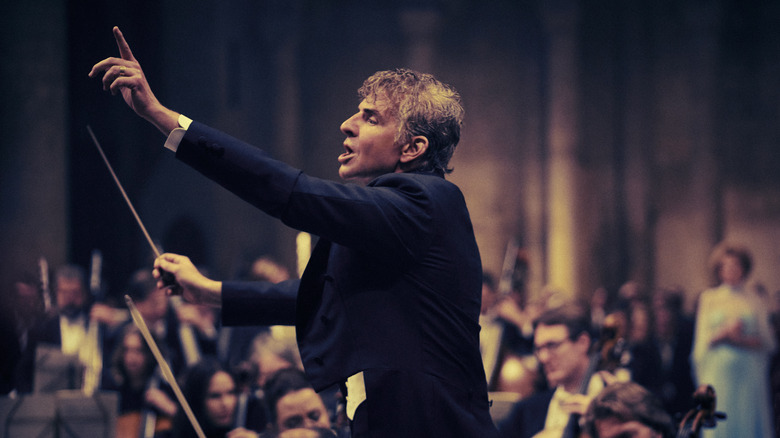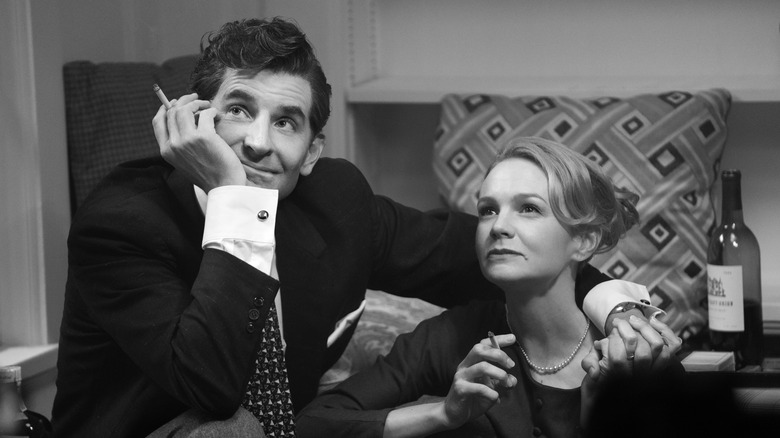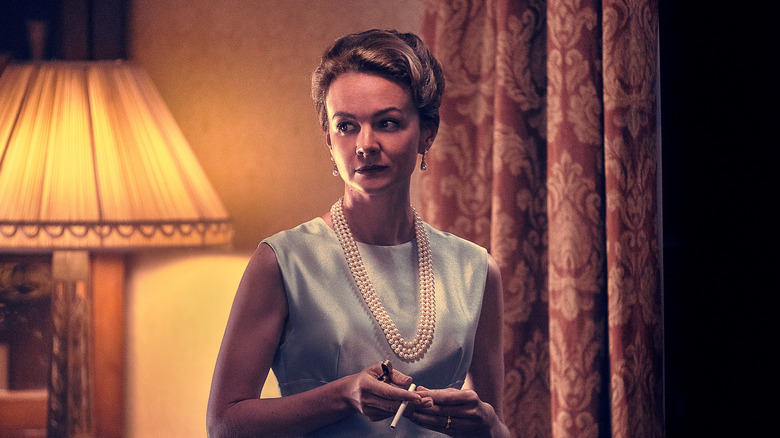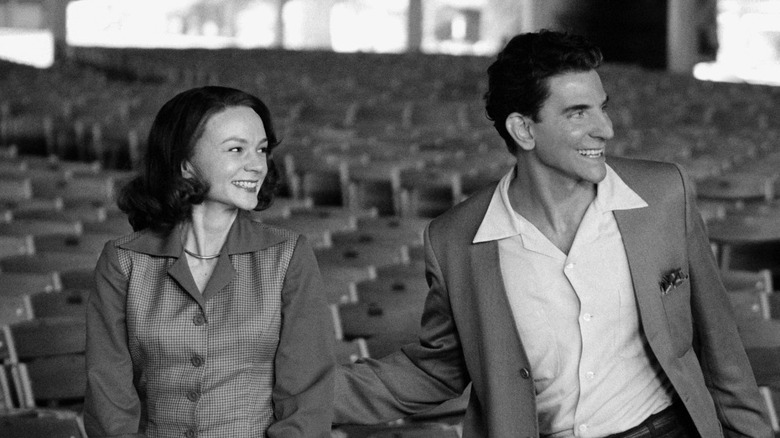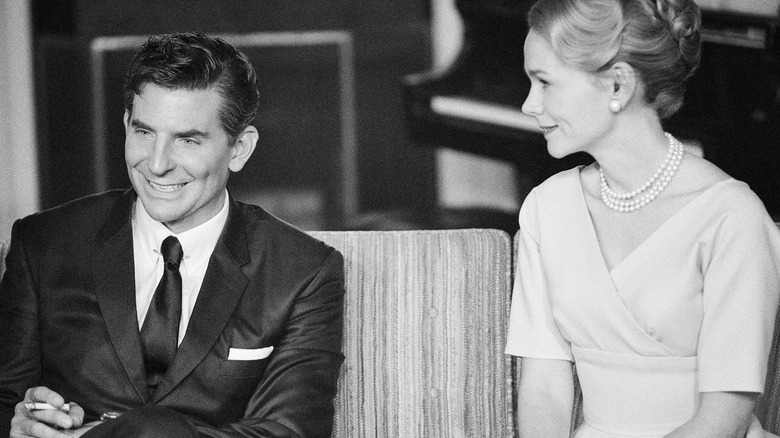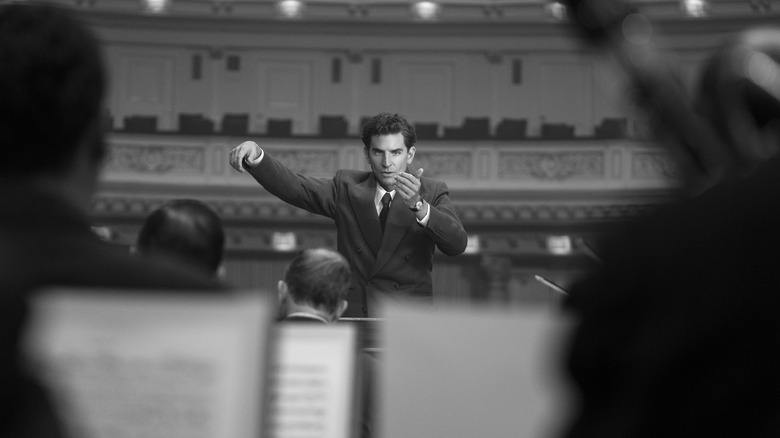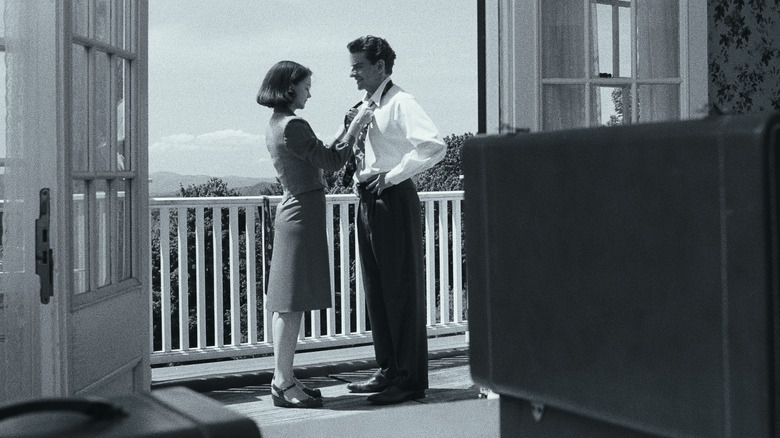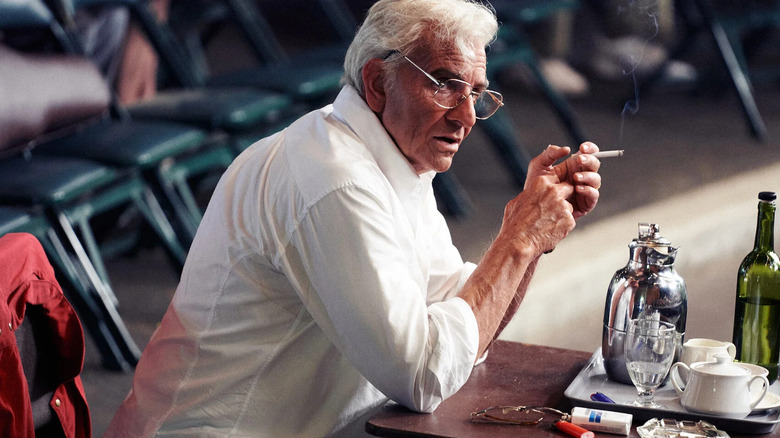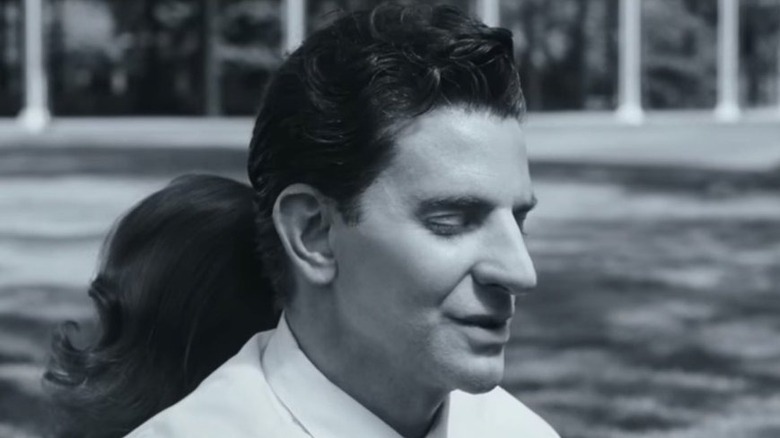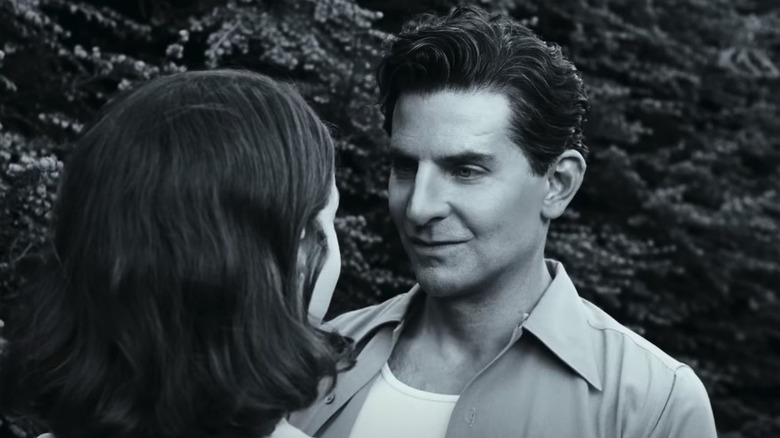The Ending Of Maestro Explained
Contains spoilers for "Maestro"
After delivering an Oscar-nominated directorial debut back in 2018 with "A Star is Born," Bradley Cooper returns behind the camera for "Maestro" — a biopic that sees Cooper portray iconic American composer Leonard Bernstein. The film depicts the life of composer Leonard Bernstein starting from his conducting debut for the New York Philharmonic to his rise to immense fame and prominence in the artistic world. The centerpiece of Leonard's story in the film is his marriage to actress Felicia Montealegre (Carey Mulligan) – which has its fair share of ups and downs. From Bernstein's struggles to maintain a balance between his home and professional life to his bisexuality causing noticeable fractures in his marriage's stability, the film takes viewers through all the rockiness and warm romance of Bernstein and Montealegre's relationship.
With "Maestro," Cooper rises to the occasion in capturing the atmospheric brilliance of Bernstein and delivers a career-best performance alongside Mulligan — both of whom provide Oscar-worthy performances. As Bernstein's marital problems persist and evolve as his career heightens and he can't resist exploring his romantic desires, the film's themes and narrative weave flawlessly and become more complicated with time. In short, there's a lot to unpack with "Maestro" — especially its ending. So, let's dive deep into the ending of "Maestro" and look at how it connects to Bernstein and Montealegre's story.
What you need to remember about the plot
Before we get into the tragic end of "Maestro" though, let's do a quick recap of everything that got us there. Soon after Leonard became famous for his renowned conducting debut for the New York Philharmonic, he met Felicia during a party at his sister Shirley's (Sarah Silverman) house. The two quickly bond over their artistic passions and the brilliance that each displays, and their admiration quickly turns to affection. Eventually, the two fall in love, get married, and start a family together. While they find relative success in their own careers, Leonard's trajectory to full-blown star of the music world is far faster. This causes Leonard's ego to grow in dangerous ways and he starts to openly explore his sexual desires — which starts to cause a major rift in his marriage with Felicia.
Leonard begins to publicly have an affair with a young man named Tommy Cothran (Gideon Glick) and the ripples of those actions eventually threaten to destroy his marriage. Felicia feels tired of playing second fiddle to Leonard's music and his lovers, while Leonard believes that her frustrations stem from jealousy — which is clearly driven by his ego. After spending some time apart, Leonard and Felicia eventually reconcile, but are forced to deal with a sudden illness that arises.
What happens at the end of the movie?
Although Leonard and Felicia have reconciled, they're given the awful news that Felicia has breast cancer and that it has spread to the point where it's terminal. The news obviously crushes Felicia, and the scenes that follow show how gut-wrenching living with cancer is for her. Despite there being happy moments with her friends and family, Felicia can barely hold back her tears and there's a dour atmosphere that's genuinely like a punch to the gut. However, Leonard stays by her side until the very end — caring for her and trying to find ways to find the light in dark times. Unfortunately, Felicia's inevitable death comes and although we're never shown a funeral sequence or any public reaction to her death, the somberness of Leonard and his family evoke the devastation of this loss.
Years later, Leonard is shown to still be working in music — teaching college hopefuls looking to conduct. Although his students show some prowess, Leonard isn't above getting in front of the orchestra himself to impress his students and, of course, show off a bit. However, he's clearly fallen back into his old ways — flirting with his admirers and students while caught in the ecstasy of the youth around him. In some ways, it seems like Leonard acknowledges how his life is fleeting and his current choices reflect that. The film ends with Leonard realizing how impactful Felicia was for him during an interview.
What does the end of the movie mean?
The final moments of "Maestro" highlight how Felicia was such a meaningful force for Leonard, and how he didn't really realize that until she was gone. In the early parts of the film, we see that Felicia and Leonard are drawn to each other through their artistic aspirations and connected mindsets that make them inseparable. It's something that drove their relationship for a long time and is partly what pushes Felicia back into her marriage with Leonard — despite his affairs. However, their relationship does have its broken moments due to Leonard's extramarital flings and the resulting tensions. It ultimately drives them apart and even when they reconcile, Felicia's cancer diagnosis puts a time limit on their life together.
After Felicia passes, Leonard finds himself back in his old rut — seemingly trying to recapture lost time. However, when Leonard is seen in the interview that started the film, he's more remorseful about Felicia's absence and now finds himself realizing the hole in his life now that she's gone. It's a pivotal and somewhat sad realization that Leonard has at this moment as it hits him how much Felicia meant to him — now possibly regretting or rethinking some of his actions in life. It's a subtly emotional and gutting way for the film to end the arc of its central maestro.
Another possible explanation
The final moments of "Maestro" also depict a sad aspect of Leonard's life after Felicia's death — that he simply reverted back to his old habits. While married to Felicia, Leonard was already shown to be a bit of a partier and unafraid to openly explore his lustful desires. Although he tried to pass Tommy off as just a friend to certain people, the romantic and sensual bond they shared was apparent to everyone. However, Leonard's time with Felicia during her cancer treatment and suffering seemed to ground him in a meaningful way. Yet, after she passes, he's shown to be back into his life of partying and trying to have lust-driven relationships with his students.
Now, there's nothing wrong with Leonard trying to recapture some of his youth or even try to find new relationships post-Felicia, since it had been years since her death by that point and he should be allowed to live his life to the fullest. But, these scenes highlight how Leonard constantly falls into his vices and desires — regardless of the unethical aspects of partying with his students. He's still trying to recapture his sense of youth and going through the mid-life crisis that drove him to someone like Tommy in the first place. For Leonard, old habits really die hard, and it's perhaps why he comes off so somber in the film's final scene.
Brilliance defeats mortality
Another intriguing theme of Leonard's story is the reality of our willingness to let people's immoral actions or choices slide if they're brilliant enough. In most cases, Leonard's infidelity would earn him public ire and probably cause his relationship with Felicia to end. However, his actions are often overlooked by most due to his likeability and brilliance as an artist. It's rare to see someone actually confront Leonard about his actions aside from Felicia and most actually defend or sympathize with him — even in conversations with Felicia. For some viewers, it'll seem bizarre how he just gets away with things at times, but it's just a result of people being so amazed by his star quality that they're willing to look past his flaws.
Even Felicia ends up admitting that she missed him regardless of how his actions played a role in their splitting up. Despite all that happened, she misses him and simply wants to be around him. It's why their embrace after Leonard's breathtaking conducting sequence in a church has this rejuvenated feel, and it's the turning point of Felicia looking past what Leonard did. The idea of incredible ability and prominence being a get-out-of-jail-free card for some is seen throughout modern celebrity perceptions and devoted fandoms, making Leonard's story a tale of brilliance beating morality.
A tale in bisexuality
Leonard's story in the film also highlights his perspective on being bisexual as it plays a factor in the personal crisis that drives him at the height of his career. Now, Leonard's story and choices don't define everyone's experience who's bisexual, nor does it represent the entire community. For Leonard, though, it becomes obvious that his bisexuality represents a part of his youth and a sense of freedom he believes became lost after being a married man for a while. When we're first introduced to Leonard, there are indications that he has explored relationships with men, but truly finds his first love when he meets Felicia. However, it's not enough for him to avoid a mid-life crisis at the peak of his career that sees him lean into exploring male relationships — which is what draws him to Tommy.
Leonard's sexuality has a deeper meaning for him that drives his sense of exploration when he deals with personal trauma. It's something that adds an interesting layer to Leonard's vices and personal interactions that signal his own struggles to achieve his personal desires. It's often a symbol of his own inner turmoil and something he'll turn to so that he can find solace or a new path forward. The film's perspective on Leonard's bisexuality isn't something that can be applied across the board, but it adds new meaning to his actions and emotions.
The devastating impact of cancer
The entire last stretch of "Maestro" sees Felicia facing a cancer diagnosis and it's an emotionally devastating portrayal of how destructive the disease can be. Although there are times when Leonard and others can make Felicia smile and lighten up the room, it's hard to look past how cruel and gutting this illness is for her. A very light and serene conversation Felicia has with her friends is suddenly interrupted by her violent coughs and it causes the entire mood to change — which leads to Felicia breaking down. There are a lot of moments of Felicia understandably being distraught by this sudden illness and Mulligan's performance makes these scenes absolutely heartbreaking.
Even for everyone else around Felicia, there are times when the bright spots aren't enough. The grim reality of someone they love going through a physically and mentally devastating illness always feels present and with Felicia never showing signs of getting better, it's only a matter of time before her body gives out. The film's depiction of Felicia's cancer leaves the film on an incredibly somber note.
Leonard's spotlight shrinking
The final moments with Leonard now as a college conducting professor soaking in the last bits of youth around him show how the spotlight has started to shrink on him later in his career. He's no longer conducting the high-profile orchestras or major public events like he used to, and now finds himself alone in a way that's likely haunting him. So, he tries to bask in the glory of his students when he can, hoping to recapture the sense of youth and sexual freedom that's been gone for him for so long. Leonard's story and actions depict the hard reality of no longer thriving in the spotlight but still yearning for recognition and self-worth.
It's what makes the final moments with Leonard in the film kind of sad for how they show him coming to the realization of how much Felicia meant to him. There are no direct regrets he states about his actions or choices in life, but that sense of melancholy and a wish to live in the spotlight for a little longer can easily be felt. The end of "Maestro" embodies all those depressing and bittersweet vibes of beginning to feel past your prime, and the ways some will try to restore that sense of glory.
Leonard's ego getting in the way
Although Leonard presented a lot of likable qualities in his personable approach, and represents that dream all artists have of being recognized for their talents, there's no denying that his ego often got in the way of his life — mainly his relationship with Felicia. As he became a renowned composer and found himself getting away with things he was doing — like his not-so-secret extramarital relationship with Tommy — he started to believe that any negative reaction to him was simply a result of jealousy. For instance, when Felicia talks to Leonard about her frustrations with him and their relationship, he tries to proclaim that she is jealous of his success and ability to perform.
Sure, Leonard is and will always be one of the most talented musicians of our time and has an unmatched legacy, but it's clear that it went to his head. Leonard's growing ego is what ultimately drives him further from Felicia for a while and what likely makes his final moments in the film so sad. When his time in the spotlight finally fades away, he's shown to be desperately looking for recognition and attention. Again, Leonard isn't a bad person and was often a positive force for the people around him, but his ego was his undoing at times.
How does the ending compare to the true story?
For the most part, "Maestro" depicts the final years of Leonard and Felicia's relationship pretty accurately, since he did take care of her until she died in 1978. However, there are some interesting details of Leonard's later life that are glossed over or left out entirely in the film. After Felicia's death, he stayed close with Tommy Cothran until he lost his battle with AIDS in 1987. Also, although the film makes Leonard's later life come across as sad and lonely, he did have some major achievements that strengthened his legacy. He received multiple awards for his accomplishments in music — including the Kennedy Center Honor for Lifetime Contributions to American Culture through the Performing Arts (1980) and becoming an Honorary Member of the New York Philharmonic (1984).
Eventually, though, Leonard announced his retirement in 1990 and died a couple of days later in his New York apartment from a heart attack. So, although "Maestro" puts a special focus on Leonard's relationship with Felicia and gives a tragic yet fitting conclusion compared to their real-life story, it does miss some of the major accomplishments and bright spots of his later years.
